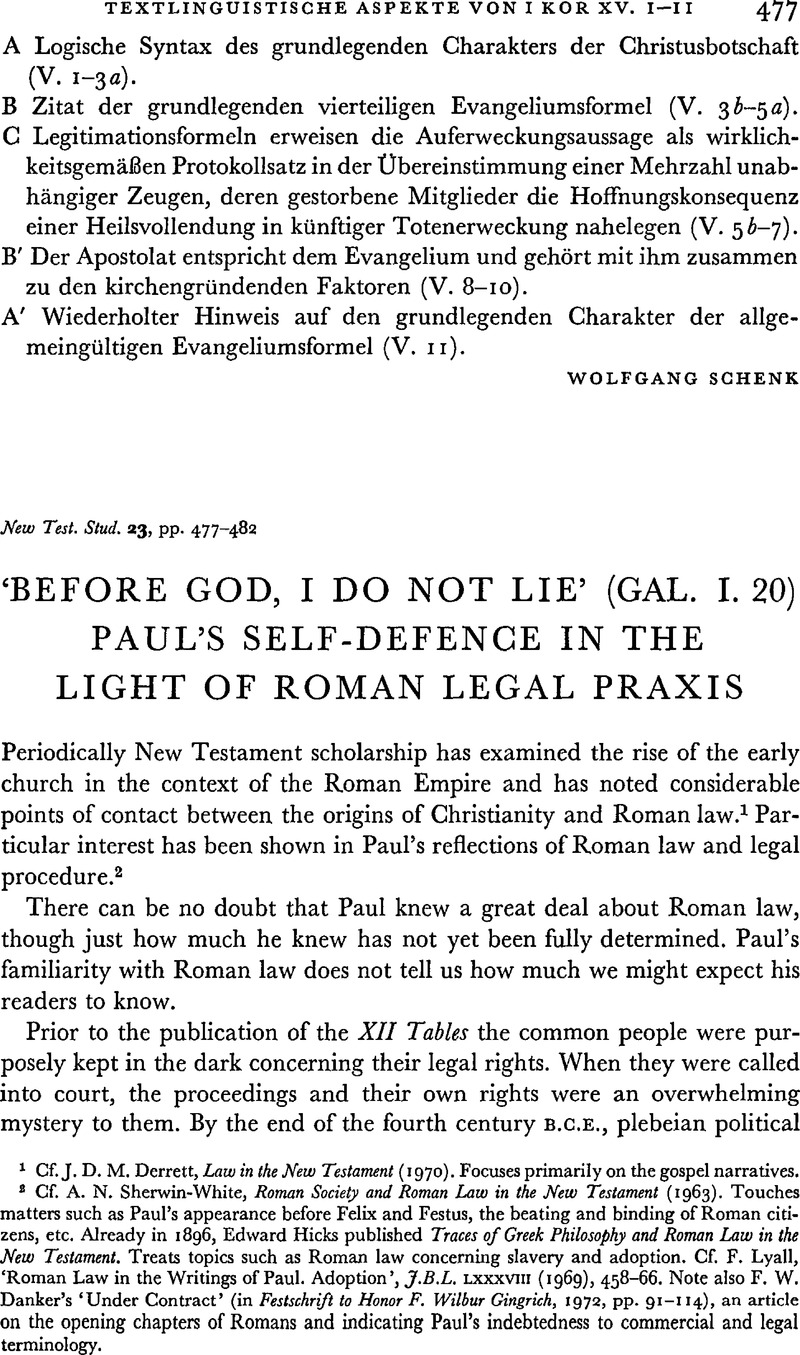No CrossRef data available.
Published online by Cambridge University Press: 05 February 2009

1 Cf. Derrett, J. D. M., Law in the New Testament(1970).Google Scholar Focuses primarily on the gospel narratives.
2 Cf. Sherwin-White, A. N., Roman Society and Roman Law in the New Testament (1963).Google Scholar Touches matters such as Paul's appearance before Felix and Festus, the beating and binding of Roman citizens, etc. Already in 1896, Edward Hicks published Traces of Greek Philosophy and Roman Law in the New Testament. Treats topics such as Roman law concerning slavery and adoption. Cf. Lyall, F., ‘Roman Law in the Writings of Paul. Adoption’, J.B.L. LXXXVIII (1969), 458–66.Google Scholar Note also Danker's, F. W. ‘Under Contract’ (in Festschrift to Honor F. Wilbur Gingrich, 1972, pp. 91–114)Google Scholar, an article on the opening chapters of Romans and indicating Paul's indebtedness to commercial and legal terminology.
1 Cf. the introduction by Warmington, E. H., Remains of Old Latin, Loeb (rev. 1967), III, xxvi–xxx.Google Scholar
2 Johnson, A. C., Coleman-Norton, P. R. and Bourne, F. C., Ancient Roman Statutes (1961), p. 9.Google Scholar
3 Ibid.
4 Taubenschlag, Raphael, The Law of Greco-Roman Egypt in the Light of the Papyri (2nd ed. rev., 1955).Google Scholar
5 Cf., for example, Pseudo-Cicero, Rhetorica ad Herennium, Quintilian, Institutio Oratoriaand Cicero, De Inventione. Cf. also Kennedy, G. A., ‘The Earliest Rhetorical Handbooks’, Amer. Jour. of Philology, LXXX (1959), 169–78.CrossRefGoogle Scholar
1 Taubenschlag, , Law of Greco-Roman Egypt, p. 509.Google Scholar Cf. Greenidge, A. H. J., The Legal Procedure of Cicero's Time (1901), p. 251Google Scholar, who lists ‘three modes in which a trial can be brought to a conclusion without a thorough hearing and a careful estimate of evidence’: ‘confession of the defendant, his neglect of proper defence, and the taking by either party of the oath…’. At stake for this paper is not the point of difference between Taubenschlag and Greenidge's list, since they both agree that the oath may abruptly terminate court proceedings.
2 Francis de Zulueta, The Institutes of Caius: Part II, Commentary (1953), p. 300.Google Scholar To the modern reader, the temptation to perjury and loose use of such an oath will seem great. Indeed the oath did become subject to abuse, but not until well after Paul's time.
3 Greenidge, , Legal Procedure of Cicero's Time, p. 260.Google Scholar ‘It was probably very effective in the business life of early Rome, and was the means of preventing many relations of life from being exposed to the scrutiny and publicity of courts.’ Cf. also Buckland, W. W., A Text-book of Roman Law from Augustus to Justinian(1921), p. 525Google Scholar: ‘It was open to a party to any dispute, whether litigation or not, to offer to the other party the opportunity to take an oath as to the truth of his claims, or himself to tender such an oath if the other party would allow it.’ Buckland further observes: ‘But whoever did take the oath in such conditions had exceptio iurisiurandi actio iurisiurandi, and actio in factum in which he need prove only that the oath was offered and taken’, p. 526. Quintilian, , Institutio Oratoria, Butler, H. E., ed. (1966, Loeb), II, 164Google Scholar, n. 1: ‘An oath might be taken by one of the parties as an alternative to evidence…an oath might be taken voluntarily before the case came into court.’
1 Greenidge, , Legal Procedure of Cicero's Time, p. 259Google Scholar: The offering of an oath ‘is a resort, not a prime agency’. From the Quintilian quotation above, it is clear that he is not enamoured of the oath, but, in an effort to counsel his readers, he knows that one may use an oath at some point or find it used against oneself. The rhetorician's true colour comes out when he suggests how to take maximum advantage in either case: ‘To offer to take an oath unconditionally without demanding that one's opponent should likewise take an oath is as a rule a sign of bad faith. If, however, anyone should take this course, he will defend his action by appealing to the blamelessness of his life as rendering perjury on his part incredible…’ (5, 6, 1). Cf. Gal. iv. 15–16: ‘What has become of the satisfaction you felt? For I bear you witness that, if possible, you would have plucked out your eyes and given them to me. Have I then become your enemy by telling you the truth?’
2 Transactio (the amicable settlement of disputes out of court, cf. Berger, Adolf, Encyclopedic Dictionary of Roman Law (1953), n.s. II, 740Google Scholar) seems to be preferred by Paul over resort to the courts. Paul's reticence to go to court entails not a rejection of legal procedure, but a mistrust of leaving the determination of justice in the hands of the unrighteous (I Cor. vi. 1, 6).
1 Hawkins, John G., The Opponents of Paul in Galatia (unpublished dissertation, Yale University, 1971), PP. 320–8.Google Scholar
2 The results of this examination of the oath in Gal. i. 20 call for the investigation of other Pauline oaths, especially in I Thess. ii. 5, II Cor, i. 23 and xi. 31.